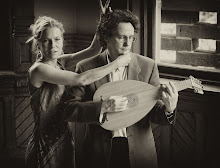Thursday, August 19, 2010
Thursday, August 12, 2010
Monday, August 2, 2010

Chris played with the violin in the short ribs (well, maybe not quite that low, but Matteis was said to play with it down there quite late in the 17th century).
Thomas Baltzar, Prelude
Biagio Marini, Sonata variata
Anon., Prelude
Marini, Romanesca
Anon., Prelude
Orlando di Lasso/Verrette, Divisions on Suzanne ung jour
Anon., Passacaglia from Sonate "Wie schon leuchtet der Morgenstern"
Tuesday, July 27, 2010
 Today we did an emergency concert at St. James Cathedral's Music at Midday series, since one of the performers who were booked had to go and look after a sick mom. The concert went pretty well, especially considering we only knew we were doing it 15 hours earlier. The music we performed is below.
Today we did an emergency concert at St. James Cathedral's Music at Midday series, since one of the performers who were booked had to go and look after a sick mom. The concert went pretty well, especially considering we only knew we were doing it 15 hours earlier. The music we performed is below. Monday, July 26, 2010
 On Sunday afternoon we sang a short set at the pre-Evensong concert at St. James Cathedral. The songs were from Harmonia Sacra, published by Henry Playford from 1688 and later expanded editions. It has all the Purcell sacred hits including the above and the Blessed Virgin's Expostulation etc. It would have been for domestic use; to sing at home on Sunday when you are feeling pious and penitent, after singing his booze and fart joke catches on Saturday night. We did some John Blow on the concert too. I played it on the theorbo. Here's a pic of that taken by Darryl Edwards (no relation).
On Sunday afternoon we sang a short set at the pre-Evensong concert at St. James Cathedral. The songs were from Harmonia Sacra, published by Henry Playford from 1688 and later expanded editions. It has all the Purcell sacred hits including the above and the Blessed Virgin's Expostulation etc. It would have been for domestic use; to sing at home on Sunday when you are feeling pious and penitent, after singing his booze and fart joke catches on Saturday night. We did some John Blow on the concert too. I played it on the theorbo. Here's a pic of that taken by Darryl Edwards (no relation).
Saturday, July 24, 2010


Leah D. Robinson, 87, wife of the late David E. Robinson of Norwalk, died Sunday, July 4, 2010, in the Norwalk Hospital.
Born October 31, 1922 in Vancouver, British Columbia, she was the daughter of the late William and Mary Ruth Eaton. Mrs. Robinson attended art college in Vancouver and served in the Women’s Royal Canadian Naval Service in London during World War II. She married David Robinson on September 16, 1946. They moved to Norwalk in 1956. In the mid 1960s, she was librarian at Kendall Elementary School. She later worked with her husband in the family business in Danbury, CT. In 2004, she took responsibility for the business, Process Measurement and Controls Inc., when her husband died. Known for her generosity, she opened her home to young people from around the world who wanted to learn English and have the experience of living in America. Some of her most cherished memories were of frequent trips to Mexico and Britain and summers at the family cabin in the Canadian woods.
She is survived by her daughters Joan Robinson of Toronto, Ontario and Mary Susan Bosch, her husband Steven Bosch, and their three children, Leah, Carter, and William, of Redding, CT. She is also survived by her sister, Grace Amanda Cooper, of Surrey, BC.
Friday, July 16, 2010

Off tonight to play at the Centre for Reformation and Renaissance Studies' appreciation party for Prof. Jane Couchman, who has been acting director this past year. Since she does Renaissance French literature we are singing some Clément Marot poems set by Claudin de Sermisy published by Pierre Attaingnant, a Basse Dance set from an Attaingnant book, a poem by Philippe Desportes set by Adrian Le Roy and a Ronsard poem about Love being stung by a bee set to music by Guillaume Tessier. Later, Sir Philip Sidney wrote his 'In a grove most rich of shade', a song from Astrophel and Stella to the Tessier's tune. That poem was published in Robert Dowland's A Musicall Banquet in 1610. We'll start off though, with an anonymous poem that tells us to Venes mes serfs et Bachus adorons... set by Clemens non Papa published in a lute version by Pierre Phalèse. The picture above is in Konrad Eisenbichler's garden from another RefRen event.

